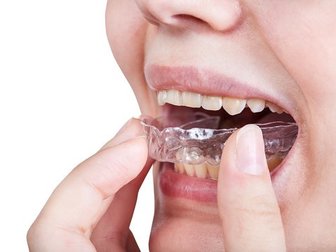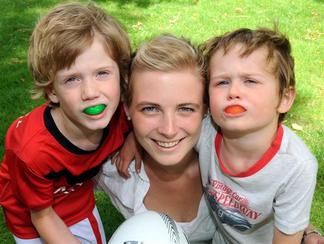 Allowing your child to brush their teeth before they are ready is among the biggest mistake parents make when it comes to their young’s oral health. There are some children who may not be brushing and flossing properly, if at all. It is important to ensure that they are doing it properly, even if it means brushing their teeth for them. When you do, take note of the following pointers:
So when should you allow them to brush on their own? If your kid is in elementary school, you could be off the hook. Below are the 6 signs that your child can clean their teeth on their own.
Teaching your child to brush properly is similar to teaching your child to wear a seat belt, putting sunscreen on your child or looking both sides when crossing the street – it is critical! Do this even as your kid gets older. It is important that your child learns the subliminal message from you so it turns a habit when they grow into adults.  Our smile is usually the first thing people notice on you. However, a lot of things such as red wine, coffee and tea can stain your precious pearl, causing them to darken. We received lots of questions from people who are considering whitening their teeth. Here are the answers to some common questions we hear. How does tooth whitening works Whitening products uses peroxide-based bleach that destroys both surface and deep stains in the tooth enamel. The level of whiteness that you can achieve will differ based on how much staining you have, the condition of your teeth and the form of bleaching system you use. Will it work on all teeth? No. It is best to discuss with your pediatric dentist before you decide to whiten your teeth because not all whitening products can correct all types of discoloration. Brown teeth may not respond well as well as teeth with gray tones. Yellow teeth often bleach well. Additionally, whitening won’t work on veneers, caps, fillings or crowns. Also, it will not be effective on discoloration due to tooth injury or medications. Is it safe for kids? The Academy of General Dentistry suggests postponing whitening until your child reaches at least 14 years of age, when the tooth pulp is completely formed. This will help reduce the level of sensitivity. But to be safe, it is still preferable to hold off and wait until he/she is 17 or 18 before giving them the green signal. Parents and teens sometimes worry when the permanent teeth appear yellower than the baby teeth. But this is perfectly normal. Aside from being smaller, baby teeth are also brighter and whiter. It does not mean that your child’s permanent teeth are healthy or stained. Further, kids that have their braces removed may complain of whiter areas where the braces were attached. This is a very common issue as those teeth got long-term protection from food stains. Can a person with highly sensitive teeth get teeth whitening treatment? Yes. There are several ways to address sensitivity issue.
It is important to talk your dentist about sensitivity problem. There are certainly ways you can do to reduce sensitivity. Avoid foods that are too cold or hot. Take pain reliever before the treatment. Use a toothpaste made for sensitive teeth along with a soft-bristled toothbrush. Avoid acidic foods such as citrus fruits. How long does it last? Teeth whitening is not permanent. If your teeth are exposed to beverages or foods that could cause staining, the whitening may begin to fade in as short as a month. But, if you avoid these foods, you may be able to maintain it as long as a year before touch-up or another treatment is necessary.  Nearly 5 million people around the world live with ulcerative colitis or Crohn’s Disease – inflammatory bowel disease (IBD) that affect the digestive system by causing intestinal tissue to be inflamed, forming ulcers or sores and causing bleeding. These conditions can affect any part of the GI tract, including the mouth, lips and esophagus. Apart from the emotional and physical toll that these diseases has on the wellbeing of a person such as diarrhea, anemia, weight loss and fever, it can also contribute negatively on the patient’s oral health. There are times when it’s difficult to determine that root cause in the changes occurring in the mouth such as dry mouth, ulcers or cavities. In some cases, medications given to treat IBD can interfere with the natural mouth bacteria, causing problems. IBD may also leaf to nutritional deficiencies, which could affect oral and dental health. In some instances, it is the disorder itself that’s causing problems. Your doctor can determine whether colitis or Crohn’s interfering with your teeth and gums’ health through testing. Vitamin Deficiencies and Mouth Ulcers Inflammatory bowel disease can cause a host of ailments throughout the intestine, esophagus as well around the patient’s mouths. Deficiencies of essential vitamins, especially Vitamin D, can result to complications ranging from small, painless wounds inside the mouth to swelling of the lips. This could lead to more serious problems such as oral tuberculosis, sarcoidosis, cheilitis granulomatosa or contact allergic reactions. Deficiencies in Vitamin B12, A, and K; and zinc as well as yeast infections are also common. Tooth Cavities and Decay Up to 29 percent of patients with IBD suffer from tooth cavities before any intestinal complications. Many patients reported higher incidence of tooth decay and cavities as they got treated for Crohn’s. Studies have shown that changes in the mucus lining caused by colitis have led to cavities in some patients. Patients taking Prednisone to alleviate their symptoms should consult their dentist and physician as there are some reports of a link between cavities and medication. Gum Inflammation Gum diseases such as bleeding or swollen gums, can be another problem for IBD sufferers and could be a result of vitamin and mineral deficiencies. Having the right vitamins and minerals is very important to achieve optimum general health and oral health, but Crohn’s disease along with mouth problems can leave your with little appetite. You have to strive to achieve quality in your diet to obtain the necessary nutrients from the food you eat. Unfortunately, in the case of Crohn’s and colitis, food passes through your system without being completely digested and absorbed. How to Achieve Healthy Oral Health The following tips will not only help your general health, they can also prevent complications on the mouth associated with IBD.
If your child has inflammatory bowel disease, we’d love to help you find the best treatment for his/her oral health.  You may be wondering: what is the difference between a dental night guard and a mouth guard? Can I use a sport mouth guard to protect from teeth grinding? Well, thankfully, this article answers these questions. What is a Dental Night Guard? An occlusal splint, more commonly called as night guard, bite guard or dental guard, is used to protect the teeth while you’re asleep. Most dentists advice the use of night guard to patients suffering from bruxism or involuntary teeth grinding. When a person habitually grinds his teeth, he is suffering from a condition called bruxism. This affects 10 percent of the total popular and as many as 15 percent of children. Bruxism can chip your teeth, increase tooth sensitivity and ruin enamel. Further, too much clenching of the haw may lead to TMJ disorder (temporomandibular joint disorder) which can sometimes require surgery.  What is a Mouth Guard? A mouth guard is an oral device that covers the gums and teeth to protect and prevent injury to the lips, gums and teeth. The American Dental Association suggests wearing a mouth guard for sports played in the winter and fall:
Checking the Material A night guard is intended to be worn every night or every time the child sleeps, so it’s made using a material that’s not too thick but tough enough to serve its purpose. On the other hand, a sports mouth guard is a device meant for athletes or players to protect their teeth from any injuries due to a physical blow on the face. Sports mouth guard is often fabricated with a thicker material. It extends to cover the entire jaw and the gums so that the whole mouth can be protected. Sports mouth guard can be made to be part of your child’s team uniform. It can be made to incorporate the team’s logo/sign or color. Understanding the Function Both mouth guards and night guards are designed to protect the teeth, however, they protect your teeth in a distinct way. A night guard works by protecting the surface of the teeth from wear and tear du to constant clenching and grinding. A mouth guard is mainly work to protect the mouth and teeth in case of accident or sudden, forceful impact. The difference between the two is that a night guard has to be made from a durable hard plastic to endure grinding over long periods of time, while a mouth guard is made from a softer material that can absorb the force of sudden blow. Also, the dental night guard only cover the occlusal surface of the teeth while the mouth guard must cover your entire teeth, as well as the gums.  What is a Dental Emergency? Injuries on the mouth may include the lips, cheeks or gums that are cut and teeth that are knocked out, loosened or forced out of position. Oral injuries are usually painful and must be treated by a dentist as soon as possible. Common Dental Emergencies and How to Respond to Them Bitten or cut lip, tongue or cheek Apply ice on the injured area to relieve swelling. If the area is bleeding, apply gentle but firm pressure using a cloth or a gauze. If the bleeding can’t be stopped or controlled by pressure application, call the doctor or visit the nearest hospital emergency room. Toothache Clean the affected tooth. Wash the mouth thoroughly with warm water and with the use of dental floss, remove any food residue that may be impacted. If the pain persists, go to your child’s pediatric dentist. Never give aspirin or apply heat on the aching gum or tooth. If there is swelling, apply cold compress and contact your dentist immediately. Knocked out baby tooth Contact your child’s dentist. Unlike the permanent tooth, the primary tooth must not be replanted because of the possible damage to the developing adult tooth. Most of the time, no treatment is needed. Knocked out adult tooth If possible, look for the tooth. Carefully handle it and never touch the root. You can rinse the tooth using water ONLY. Never clean it with soap or mouthwash, handle or scrub the tooth unnecessarily. Check the tooth for any breaks or fractures. If it is intact, try to reinsert it back in the socket and let the patient keep the tooth in place by biting on a clean cloth or gauze. In case you can’t reinsert it, place the tooth in a cup containing milk or the patient’s saliva and not water. Transport it to your dentist immediately. Time is very critical in saving the tooth. Fractured or chipped baby tooth See your pediatric dentist immediately. Fracture or chipped permanent tooth Again, time is very critical to prevent infection or the need to have extensive dental treatment. Contact your dentist as soon as possible. Rinse the mouth with water. Apply cold treatment if there is swelling. If you can find the chipped tooth, bring it with you to the dentist. What can I do to be prepared for dental emergencies? To be prepared for any dental emergencies, prepare this emergency dental care kit:
|
AuthorMint Kids Dentistry Archives
July 2021
Categories |
Location |
|
Sitemap
|
Forms
|

 RSS Feed
RSS Feed